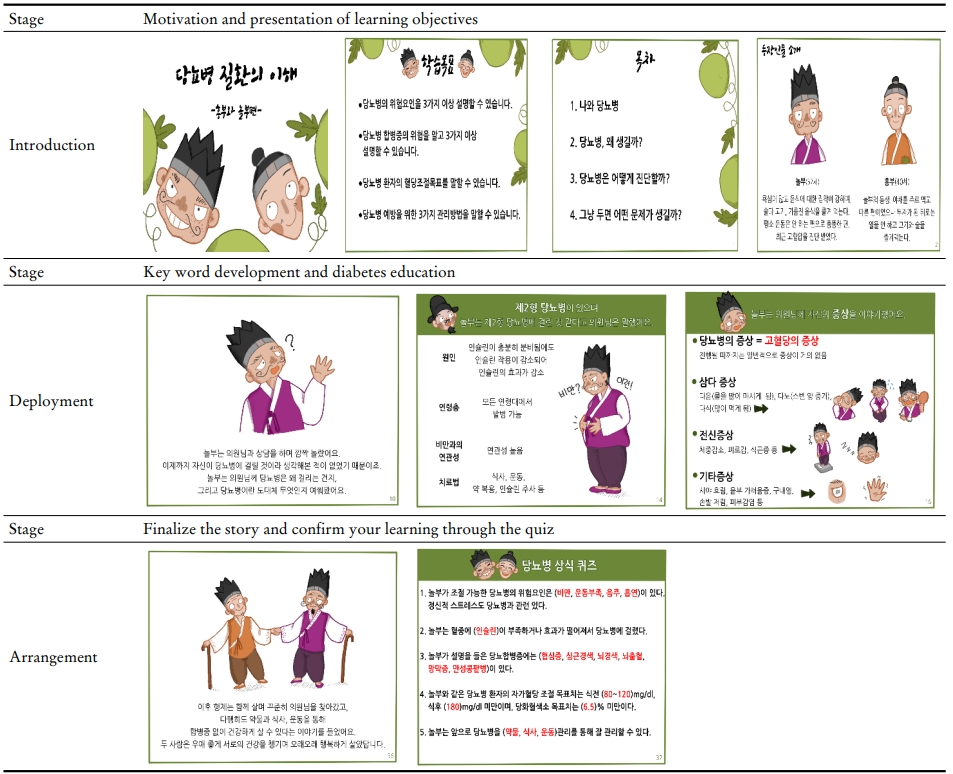Korean J Health Promot.
2022 Jun;22(2):113-122. 10.15384/kjhp.2022.22.2.113.
The Development and Effect of a Storytelling Based Diabetes Education Material: Focus on Rural Elderly with Diabetes
- Affiliations
-
- 1Department of Nursing, Gangneung Yeongdong University, Gangneung, Korea
- 2College of Nursing, Kangwon National University, Chuncheon, Korea
- KMID: 2531099
- DOI: http://doi.org/10.15384/kjhp.2022.22.2.113
Abstract
- Background
Health literacy is the degree to which individuals have the capacity to obtain, process, and understand basic health information. It should be considered to make appropriate health education. The aims of this study were to develop the new diabetes education material using storytelling for improving health literacy and to determine the education effects.
Methods
A new storytelling based education material was developed using ADDIE (Analyze, Design, Develop, Implement and Evaluate) teaching model. The content was compiled using Korean traditional fairy tales by researchers and a storytelling writer. For determination on effectiveness of education, non-equivalent control group experimental design was used. The participants were 49 rural elders who visiting elderly welfare center; experimental group (25) received education using the new developed material and control group (24) received education using the existing material. The measurement variables for education effectiveness were diabetes health literacy, diabetes knowledge, diabetes self-efficacy and diabetic self-care behaviors. Data were analyzed with SPSS/WIN 21.0 program for mean comparison between two groups.
Results
Diabetic health literacy, diabetic self-efficacy, and diabetic self-care behaviors scores were higher in the experimental group than the control group except diabetes knowledge score.
Conclusions
Based on research findings, the new education material using storytelling was considered to be easier and more interesting than existing materials for rural elderly to be educated, which improved health literacy more. Using storytelling in health education might be more effective for rural elderly.
Keyword
Figure
Reference
-
1. Korean Diabetes Association. Diabetes Education Guidelines [Internet]. Seoul: Korean Diabetes Association; 2016 [cited Jun 6, 2018]. https://www.ncbi.nlm.nih.gov/pmc/articles/PMC5016294/.2. Gazmararian JA, Williams MV, Peel J, Baker DW. Health literacy and knowledge of chronic disease. Patient Educ Couns. 2003; 51(3):267–75.
Article3. Institute of Medicine. Health Literacy: a prescription to end confusion. Washington, DC: National Academies Press;2004.4. Sayah AF, Majumdar SR, Williams B, Robertson S, Johnson JA. Health literacy and health outcomes in diabetes: a systematic review. J Gen Intern Med. 2013; 28(3):444–52.
Article5. Kreps GL, Sparks L. Meeting the health literacy needs of immigrant population. Patient Educ Couns. 2008; 71(3):328–32.6. Lee TW, Kang SJ. Health literacy in the Korean elderly and influencing factors. Journal of Korean Gerontological Society. 2008; 28(4):847–63.7. Park JY, June KJ. Influencing factors on functional health literacy among the rural elderly. J Korean Acad of Community Health Nurs. 2011; 22(1):75–85.
Article8. Lee SJ. The developments and evaluations of a health literacy considered diabetes self-management program for older adult [dissertation]. Seoul: Seoul National University;2016. Korean.9. Chin YR, Choi KW. Readability and suitability evaluation of educational materials on diabetes mellitus. The Korean Journal of Health Service Management. 2014; 8(2):161–74.
Article10. Day V. Promoting health literacy through storytelling. OJIN 2009;14(3):Manuscript 6.11. Simpson JA, Weiner ESC. The Oxford English Dictonary. 2nd ed. New York: Oxford University Press;1989.12. Ji YH. A study on the effects of storytelling learning programs for the elderly [dissertation]. Bucheon: Catholic University;1985. Korean.13. Chew LD, Bradley KA, Boyko EJ. Brief questions to identify patients with nadequate health literacy. Fam Med. 2004; 36(8):588–94.14. Kim SH. Older adults' self-reported difficulty in understanding and utilizing health information. J Korean Gerontol Nurs. 2010; 30(4):1281–92.15. Yamashita T, Kart CS. Is diabetes-specific health literacy associated with diabetes-related outcomes in older adults? J Diabetes. 2011; 3(2):138–46.
Article16. Park OJ. The effect of social support on compliance with sick-role behavior in diabetic patients [dissertation]. Seoul: Yonsei National University;1985. Korean.17. Song MS, Choi SY, Kim SA, Lee SJ, Kim EH. Development and validation of the diabetes management self-efficacy scale for older adults (DMSES-O). J Muscle Jt Health. 2014; 21(3):184–94.
Article18. Kim YO. A hypothesized model for self-care behavior in diabetic patients: based on stress-coping model [dissertation]. Seoul: Yonsei National University;1997. Korean.19. Ellis G, Breaster J. Tell it again!: the storytelling handbook for primary English language teachers [Internet]. Lodon: British Council; 2014 [cited May 2, 2018]. Available from: http://learnenglishkids.britishcouncil.org/.20. Baker DW. The meaning and measure of health literacy. J Gen Intern Med. 2006; 21:878–83.21. Bandura A. Self-efficacy: toward a unifying theory of behavioral change. Psychol Rev. 1977; 84(2):191–215.
Article22. Korea Disease Control and Prevention Agency (KDCA). Diabetes Education Manual [Internet]. Cheongju: KDCA; 2015 [cited Apr 1, 2018]. Available from: https://www.kdca.go.kr/index.es?sid=a2.23. Kim S, Love F, Quistberg DA, Shea JA. Association of health literacy with self-management behavior in patients with diabetes. Diabetes Care. 2004; 27(12):2980–2.
Article24. Dewalt DA, Pignone MP. The role of literacy in health and health care. Am Fam Physician. 2005; 72(3):387–8.25. Ahola AJ, Groop PH. Barriers to self-management of diabetes. Diabetic Medicine. 2013; 30(4):413–420.
Article26. Choi SY, Song MS. Behavior change theories in diabetes selfmanagement: a conceptual review. Perspect Nurs Sci. 2010; 7(1):1–9.27. US Department of health and Human Services. Health communication. In: Healthy people 2010. 2nd ed. Washington, DC: US Department of health and Human Services;2000.28. Schwartz M. Connecting to language through story. Language Arts. 1987; 64(6):603–10.29. Yang MK. Significance and utilization of storytelling education. J Korean Yeolin Education. 2013; 21(3):1–30.30. Kim M. Development of diabetes education material for older people with low health literacy in rural community [dissertation]. Mokpo: Mokpo National University;2018. Korean.



